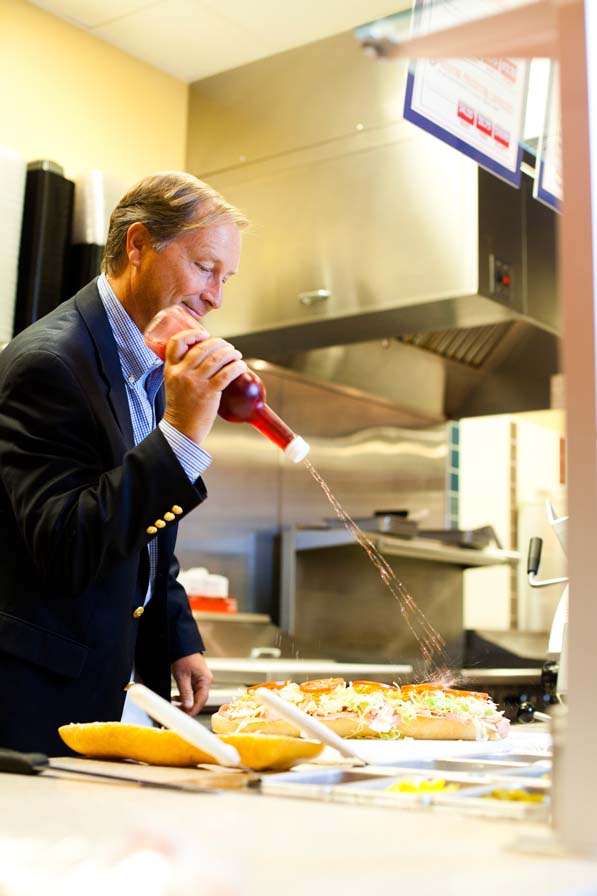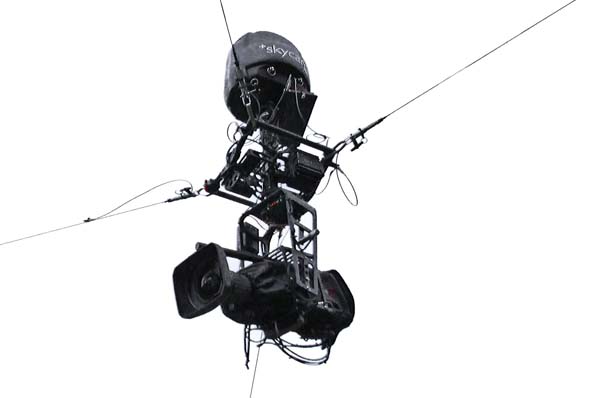It was the summer of 1956 when a budding entrepreneur had a big idea for Point Pleasant, New Jersey. The small beach town was populated with family-owned shops and restaurants, and was a destination retreat for New Yorkers to beat the heat. The entrepreneur’s plan was simple. He would offer a culinary experience that the locals and visitors alike had never seen: the submarine sandwich. The entrepreneur’s name? Mike. His last name? Well, that’s been lost to history. The restaurant though, lives on.
Today, Mike’s Subs is called Jersey Mike’s Subs, and the restaurant has grown well
beyond its single storefront. In fact, the nationwide chain is now making a name for itself coast to coast. Known for its fresh grilled, East Coast-style subs, Jersey Mike’s has more than 600 restaurants to its name. But with new stores opening as fast as the company can mix the vinaigrette, the culture that defined the first shop remains the same.
The Earl of Sandwich Finds an Heir
With its friendly atmosphere, Mike’s Subs stood out from other shops in Point Pleasant. The staff learned the customers’ names and their favorite subs. Word of the unique sandwiches spread, and soon, the shop had customers willing to stand in line in the summer sun waiting for a taste. Over time, Mike’s Subs became a routine destination for the summer crowds and a leading business in the Point Pleasant community.
In 1972, Peter Cancro was a high school senior living in Point Pleasant. He had begun working at Mike’s Subs when he was only 14. Facing graduation, Cancro decided that the iconic sandwich shop was more than just a place for summer employment, but the launching pad for a career. When he heard the shop was up for sale, he contacted his former Pop Warner football coach, who happened to be a local banker, and asked if a loan was possible. Even in today’s age, it’s rare that a high school student hopes to run his own business. But the banker saw something special in Cancro and agreed to help him. With that, at the young age of 17, and still unable to legally slice a sub, Cancro became the owner of his own shop. He quickly fell in love with the store and decided to build the business by launching new sub shops along the Jersey Shore. “It was a success story from the start,” says Hoyt Jones, president of Jersey Mike’s. “People lined up for the subs.”
As more shops opened, the brand’s reputation expanded. Visitors to the shore carried word of the subs back to their home communities, and soon Cancro began to see the opportunity to take Jersey Mike’s far beyond the seaside towns in which it had initially thrived.
In 1987, Cancro contacted a franchise consulting firm in Chicago to explore the possibility of franchising the business. Cancro hit the market at just the right moment. “At the time, other sub concepts like Subway were just beginning to take off and helped to make the sub a known and appreciated sandwich category,” Jones says.
The chain grew steadily over the years. By the time Jones joined Jersey Mike’s in 2008, the company had 320 stores and was growing fast. “They were already incredibly successful before I joined,” Jones recalls. Today, the sub chain continues to win awards in virtually every market it enters.
The Right Talent Comes On Board

Hoyt Jones is more than happy to venture from HQ to the storefront. Here, he douses a fresh sub with the company’s patented vinaigrette. Photo: Samantha Simmons
With a background in franchise operations as a former executive vice president at Domino’s Pizza, Jones was the perfect fit for the rapidly growing sandwich chain. Beyond that, he had experience on both sides of the franchise equation, as both a franchise executive and as a franchise owner. “In 2002, I went into business with my brother-in-law,” Hoyt explains. “We bought a dozen Domino’s in Michigan, and were also involved in partnerships in other areas of the country.”
Since joining Jersey Mike’s, Jones says existing operators have been encouraged to extend the Jersey Mike’s brand by opening additional restaurants in their markets. In turn, this momentum has helped Jersey Mike’s attract interest from new, multibrand and multiunit franchisees. Prior to this point, the majority of Jersey Mike’s franchisees were single-unit owners. However, the company believed that it could better manage its expansion if it brought in more multiple-store franchisees—people who could open and run three, five, or ten stores.
Multiple restaurant franchisees bring several advantages to the business. “They have a deeper knowledge of the restaurant business, because they operate more than one location,” Jones explains. “Franchisees who own multiple stores are also typically better capitalized. Their existing businesses allow them to leverage additional financing to open new locations.”
Another key benefit of multiunit franchisees is less obvious. Owners of multiple stores are continuously developing their talented employees, who run the day-to-day management of their businesses for them. “Many operators have built up their organizations and have people coming up through their pipeline that they need to provide opportunities for,” Jones says. “It speaks to the loyalty owners have to their people in assisting them in becoming equity partners, too. Multiunit franchisees also tend to be at an age where they are just as interested in opening new stores as they are in helping the people who work for them.”
Creating the Right Partnerships
With a successful brand name, Jersey Mike’s has no trouble attracting potential franchisees
from other brands, including Dunkin’ Donuts, Wingstop, Smashburger, and Carl’s Jr. But the company scrutinizes each franchise applicant to determine whether the partnership is a good fit for both parties. After an initial screening, a potential franchisee must undergo an “in-store” experience at a Jersey Mike’s shop. “We put them in a store from one to three days, slicing onions and cutting tomatoes, making subs, and wiping down tables,” Jones explains. “It gives us a chance to see whether they are a good match for our business model.”
Assessing a potential franchisee’s customer-service abilities is a key part of the process. “As much as we are interested in speedy service and unit profitability, we also want an intimate relationship between the people making the subs and the customers,” Jones says.
Sandwich Talk
with Hoyt Jones
What’s it like working with Peter Cancro?
From the moment you meet Peter, you realize what a good person he is. He is very down-to-earth, very hands-on. We just kind of clicked even from the first meeting.
What’s your favorite sub on the menu?
Being from New Jersey myself, I love the number 13, the “Original Italian.” It probably goes back to when I was a kid. I didn’t grow up on the Jersey Shore; I grew up in South Jersey. Eating a sub with the classic olive oil and red wine vinegar really brings me back.
How has your taste in sandwiches changed?
You know, it’s funny. When I think about a sandwich now, my taste buds immediately begin gravitating toward a hot or cold sub—especially a hot, cheesesteak sub. It just melts in your mouth.
Have you tasted anything that surprised you?
I’m the kind of guy that would never eat tuna fish unless my mother made it. But on one of my first trips to a shop with Peter, he said, “You have to try the tuna made Mike’s Way.” You put the red wine vinegar on a tuna sub and the flavor is just unbelievable.
This focus on customer service stems from Cancro’s interest in the local community. “Right from the start, Peter looked to be a part of the community, feeding the local teams after the game and greeting the buses with armfuls of subs,” Jones explains.
Giving back to the community is a core part of the chain’s business philosophy, and this is often one of the things that attracts potential franchisees to Jersey Mike’s in the first place. “We’re not looking for people who are going to come in and just make a quick buck,” Jones says. “We want a long-term relationship with the franchisees and their employees.”
Once a franchisee has been selected, Jersey Mike’s provides support to ensure the new shop’s success. The company offers assistance with financing and provides operational training, as well as store-design expertise. “If the franchisee is someone who hasn’t been in the restaurant business before, then we work with them all the way through,” Jones says.
Once store construction is complete, a marketing team is ready to help the owner create a marketing strategy and produce advertising and promotional materials. While a franchisee’s store is under construction, they spend at least 360 hours at a certified training location learning how to make subs and absorbing the company’s service standards. The training culminates in a weeklong training session at the Jersey Shore to get a feel for the relaxed seaside ambiance that the company wants to recreate in its shops. After the stores open, a field team is provided to help the franchisee through the first few weeks to make sure the shop launches properly. “We treat the franchisees like members of the family and want everyone to be successful,” Jones says.
A Taste of Jersey in Every Store
Every Jersey Mike’s store features memorabilia and seascape prints evoking the boardwalk and beach atmosphere of the Jersey Shore. Customers entering a Jersey Mike’s encounter a central refrigerated meat case displaying the chain’s proprietary products. An old fashion deli slicer and grill are also placed prominently so that customers can watch as their subs are made. Roast beef is brought into the shops and is trimmed, tied, and cooked on site. “Its aroma is incredible when they open that oven door,” Jones says. “It’s just like your grandmother’s house.”
Since Jones joined Jersey Mike’s the chain has added more than 200 shops, even as the economy went into a downturn. “The strength of the brand sustained us,” he says. “Our business model was strong prior to 2008, and it continues to be strong today.”
Jersey Mike’s ongoing success is due to the quality and strength of the franchisees and the management team in place. “We are adding about 30 new contracts a month,” Jones says. “We will be over a thousand stores open or under contract within a few months.”

